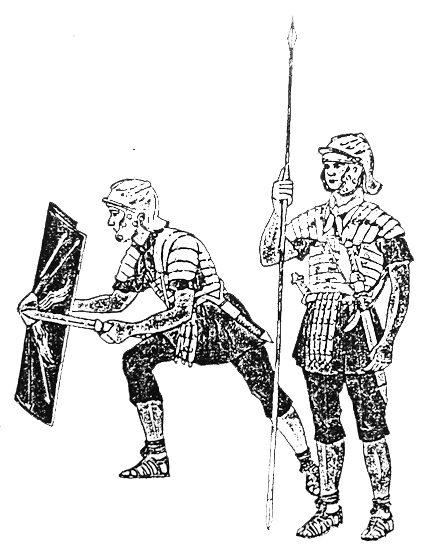The Roman Conquest
History of Britain, The Roman Conquest. By 60 BC, the Romans had conguered much of the land around the Mediterranean. One great general named Julius Caesar had overrun nearly all France, but had experienced a lot of trouble from the Belgae. They were, he knew, receiving help from their kinsmen in Britain. There was only one thing for it; Britain would have to be invaded.
On the morning of 25 August, 55 BC, a fleet of eighty transports escorted by war galleys sailed from a point on the French coast near Boulogne. At 10 AM, the ships reached the shores of Kent between Deal and Walmer.
On board the transports, packed shoulder to shoulder, were 10,200 men of the 7th and 10th Legions. Somewhere out at sea, there were eighteen more vessels with 240 cavalrymen and their horses on board, but there was no sign of them. THe captains had made a disastrous mistake. They had misjudged the tides. The horse soldiers never turned up.
Caesar, too, had made a mistake. Despite his battles against the Belgae in Europe, he had under-rated their military strength in Britain. As the Roman soldiers saw them waiting on the beach, led by their king, Cassivelaunus, they hesitated. Nobody seemed anxious to go ashore.
Eventually, the standard bearer of the 10th Legion jumped into the surf and urged the men to follow him. Minutes later, the fight began.
It was not Caesar's day. The opposition was much tougher than he had expected, and heavy casualties were piling up in his ranks. To make matters worse, the weather was getting bad, and a number of ships were wrecked on the shore. Prudently, Caesar decided to withdraw. The conquest of Britain would have to wait.
Next year, he came again with a much larger force. The weather for the crossing was fine. Five legions and two thousand cavalrymen came ashore. Three more legions and more horse soldiers waited off coast in reserve.
Over the Channel, the clouds were massing for what paromised to be another storm. This time, Caesar ignored the threat. Some of the ships were hauled ashore and earthworks hastily dug up around them. They served as forts to protect the beach head.
Cassivelaunus's men were fighting desperately, but there was little they could do against such a well armed and disciplined enemy. The Romans broke through. They marched as far as Wheathampstead in Hertfordshire, where they fought another battle. But Cassivelaunus had had enough. He surrendered, agreed to pay taxes to Rome and to hand over hostages.
His purpose accomplished, Caesar withdrew to the Kent coast. He re-embarked his army, and set sail back to France. For the better part of one hundred years, there were no more visits by Roman soldiers to Britain.
The Roman Soldiers
The backbone of the Roman army was its infantry - the legionaries, as they were called. They were armed with light spears, swords and daggers. The officers wore metal breast-and back-plates; the common soldiers had to be content with leather. Each man had a shield.
A man served in a legion for sixteen years-after which he had to put n another four years as a 'veteran' (veterans did not have to perform duties within the camp, and they were only called to fight in a emergency).
The pay was poor, and many of the men depended an allowances from theirs parents. Meals usually consisted of soup, bread, vegetables and occasionally a little wine. They seldom had any meat.
Discipline was strict. Desertion, mutiny and insubordination were punished by death. Stealing, inefficiency and lying - by flogging. The penalty for lesser offences was loss of rank.
When not campaigning, the legionaries spent their time supervising the building of roads and forts. Until the year AD197, they were not allowed to marry - though many of them did.
Read previous : Celtic Britain, British Developments slow, or read the next article : Romans on the March
The Roman Soldiers
The backbone of the Roman army was its infantry - the legionaries, as they were called. They were armed with light spears, swords and daggers. The officers wore metal breast-and back-plates; the common soldiers had to be content with leather. Each man had a shield.
A man served in a legion for sixteen years-after which he had to put n another four years as a 'veteran' (veterans did not have to perform duties within the camp, and they were only called to fight in a emergency).
The pay was poor, and many of the men depended an allowances from theirs parents. Meals usually consisted of soup, bread, vegetables and occasionally a little wine. They seldom had any meat.
Discipline was strict. Desertion, mutiny and insubordination were punished by death. Stealing, inefficiency and lying - by flogging. The penalty for lesser offences was loss of rank.
When not campaigning, the legionaries spent their time supervising the building of roads and forts. Until the year AD197, they were not allowed to marry - though many of them did.
Read previous : Celtic Britain, British Developments slow, or read the next article : Romans on the March

